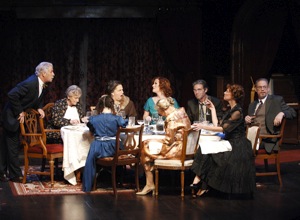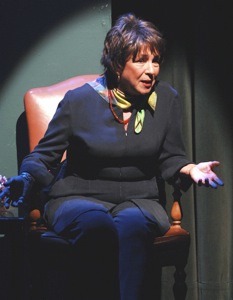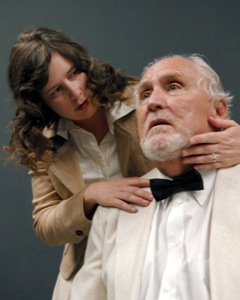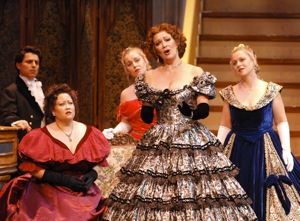Arts & Entertainment
Of politics and art, despair and hope, love and loss
Published Thursday, 15-Nov-2007 in issue 1038
The Magic Fire
“I am an immigrant in a country of immigrants,” says narrator Lise Berg (Sandra Ellis-Troy) at the beginning of The Magic Fire. Lillian Garrett-Groag’s play runs through November 18 at Moonlight Stage Productions’ Avo Playhouse in Vista, directed by Kathy Brombacher.
Lise is talking about the U.S., her adopted country, but she could as easily mean Argentina, to which her large and boisterous Austrian-Italian family fled in 1938, when Lise was just a child. The Magic Fire is a memory play about Argentina in the early ‘50s, when Juan and Eva Perón ruled and the political situation was taking on aspects of the Europe they had left.
Garrett-Groag uses the adult Lise to comment on, and in some cases interact with her 7-year-old self (Rebecca Lauren Myers), as a way of pointing out that memory is selective and sometimes just plain faulty: “No! That’s not the way it was!” admonishes the adult Lise as a scene plays out.
Lise’s family is large, boisterous and devoted to opera and literature. In fact, it uses the arts to shield it from the ugly events going on outside. Included in the group are the Italian Guarneris: “Nonna” Maddalena (Trina Kaplan), the cranky, 97-year-old matriarch, stooped of posture but definite of opinion; her son, Lise’s expansive and loving grandfather Gianni (Paul Bourque); the unmarried and eccentric great-aunt Paula (Dagmar Krause Fields), and Aunt Elena (Marci Anne Wuebben), an actress whose refusal to join the Peronist party has rendered her unemployable. On the Austrian side are Lise’s Viennese engineer father Otto Berg (Jeff Anthony Miller) and Italian mother Amalia (Terri Park) and Aunt Clara (Li-Anne Rowswell), the voice of Parisian sophistication.
Family friend and journalist Alberto Barcos (Thomas Hall) has his own anti-Peronist opinions and skates on the edge of political problems with old college buddy (now neighbor) Gen. Henri Fontannes (Jesse MacKinnon), an Argentinian functionary whose job may jeopardize his genuine concern for the family. And housekeeper Rosa Arrua (Rhona Gold) unintentionally brings politics inside the house.
Named by Time magazine as one of the 10 best plays of 1998, The Magic Fire is not so far removed from Chekhov, especially in the noisy dinner scene in the second half of the first act (Avo compresses the three-act play into two). Here, the voluble group discusses the relative merits of German vs. Italian singers (the “chalky” German sound vs. “sunshine” from the Italians), but the family rule is no religion or politics at the dinner table. Discussing religion is rude, politics vulgar, and acknowledging the evil outside will require action. A screech of tires and a siren outside prompt Gianni to close the drapes without comment.
The “magic fire” refers to Wagner’s Die Walküre, in which head god Wotan gives Brünnhilde a sleeping potion and sets her on a rock surrounded by fire to keep her safe from all but the bravest man. Likewise, Otto tries to surround his family in a cocoon of culture and beauty to keep out the ugliness that tries to encroach. (The parallel is not exact: Wotan’s action is punishment for Brünnhilde’s disobedience.)
The Magic Fire is an engaging. Although long and talky piece, and running the first two acts together makes a long sit for the audience. Also, Garrett-Groag’s use of the two ages of Lise is clever but problematic. It allows her to make the point that memory and nostalgia sometimes lie, but it also creates some awkwardness when the adult Lise has to stand around onstage doing nothing for long stretches.
Brombacher is blessed with a fine cast – the Guarneri women are particularly well drawn and well played – and Garrett-Groag has such a good feel for literate and engaging conversation that we are happy to have met this family.
The Magic Fire plays through Nov. 18 at Moonlight Stage Productions’ Avo Playhouse in Vista. Shows Thursday through Saturday at 7:30 p.m.; matinees Saturday and Sunday at 2 p.m. For tickets call 650-724-2110 or visit www.vistixonline.com.
The Night of the Iguana
A defrocked priest, a newly widowed hotel manager and the middle-aged caretaker of her 97-year-old grandfather learn to live beyond despair in Tennessee Williams’ last successful play, The Night of the Iguana, playing through Nov. 30 at OnStage Playhouse in Chula Vista. XYZ directs.
Rev. T. Lawrence Shannon (Rob Conway), defrocked Episcopal priest turned tour guide, arrives at the Costa Verde hotel on the Pacific coast of Mexico with a group of 11 female tourists from the Baptist Female College in Blowing Rock, Texas. At least one of them, gym teacher Miss Fellowes (Kirsten Gallon), is irate. The Costa Verde is not on the itinerary and she has convinced the rest of the women to stay on the bus in the sweltering sun until Shannon takes them to the hotel promised in the travel brochure.
But Shannon, dealing with his own demons, finds a need to escape from this tour group from hell. He refuses to surrender the bus ignition key, intending to spend the next three days at Costa Verde, mostly in the hammock and always in the care of old friend and wannabe bed partner Maxine Faulk (Sarah Ditges).
He finds that Maxine’s husband Fred died less than two weeks ago, leaving her with bills and a few demons of her own.
The last in this triumvirate of despair is 40-year-old Hannah Jelkes (Holly Stephenson), a quick-sketch artist who has devoted herself to the full-time care of Nonno (Ed Eigner), the “oldest living and practicing poet,” as they travel around the world, offering sketches and impromptu readings for a few dollars. Nonno, whose memory is failing, is working on his last poem; Hannah, with no life of her own, is trying to prepare herself for the inevitable.
These three characters feel as trapped as the titular iguana tethered under the verandah by Maxine’s Mexican muchachos, where it will be fattened up for dinner at some time in the near future.
On Rosemary King’s terrifically evocative set, replete with wonderful little details like Mexican figurines and pottery, these three will play out their stories, punctuated by the somewhat jarring but welcome comic relief provided by boisterous German tourists Herr and Frau Fahrenkopf (Michael Dean Grulli and Ruth Eigner), who guzzle beer, giggle a lot, sing on no provocation and rejoice at radio reports of the Battle of Britain (the play is set in 1940).
Conway does a fine job with the difficult role of Shannon, who spends the play teetering on the edge of a breakdown. Stephenson’s calm strength and acceptance of that which cannot be changed provides a fine counterbalance. Ditges wasn’t quite in command of all her lines on opening night, and had a tendency to mumble some of them.
Gallon is a stitch as the butch gym teacher, Ed Eigner perfect as the poet and Kelly Wood fine as Shannon’s latest underage conquest.
Williams, whose best works are about outsiders and those with broken or twisted psyches, is best known for his four greatest commercial successes: The Glass Menagerie, A Streetcar Named Desire, Cat on a Hot Tin Roof and The Night of the Iguana. Iguana was his last commercial success and is also his most positive piece.
The Night of the Iguana plays through Nov. 30 at OnStage Playhouse in Chula Vista. Shows Thursday through Saturday at 8 p.m.; Sunday at 2 p.m. For tickets call 619-422-7787 or visit www.onstageplayhouse.org.
The Swallow (La Rondine)
This is your last weekend to see a rarely performed Puccini work. It’s The Swallow (La Rondine), the composer’s only operetta, and Lyric Opera San Diego presents it at Birch North Park Theatre through Sunday. J. Robert Montgomery directs; James Lowe conducts.
With wonderful sets and gorgeous costumes, Lyric offers a lovely piece that looks as good as it sounds.
First performed in 1917, The Swallow has elements of other operas including La Traviata, Turandot and La Bohème, easily picked up by even those barely acquainted with opera. The plot, for example, borrows heavily from La Traviata: Magda (Suzan Hanson) is a courtesan who falls in love with an inappropriate man and breaks his heart.
The main quartet showcases a powerhouse of musical talent. Suzan Hanson (Magda) has a powerful voice that I would like to hear in a larger hall. Enrique Torál’s smooth as silk tenor makes Prunier one of the most listenable characters, and Chad A. Johnson gives heroic cast to Ruggero, the other principal tenor role. Susan Holsonbake’s maid Lisette is a delight in the lower registers, although she tends to screech a bit in the stratosphere.
Don’t expect a major musical experience here. This is an eminently listenable score, but it’s not Puccini for the ages. Still, Los Angeles and San Francisco opera companies will produce The Swallow later this season, and this is a fine production of a seldom-heard work.
The Swallow plays through Nov. 18 at the Birch North Park Theatre. Remaining shows Thursday and Saturday at 7:30 p.m. and Sunday at 2:30 p.m. For tickets call 619-239-8836 or visit www.lyricoperasandiego.org.
|
|
Copyright © 2003-2025 Uptown Publications






